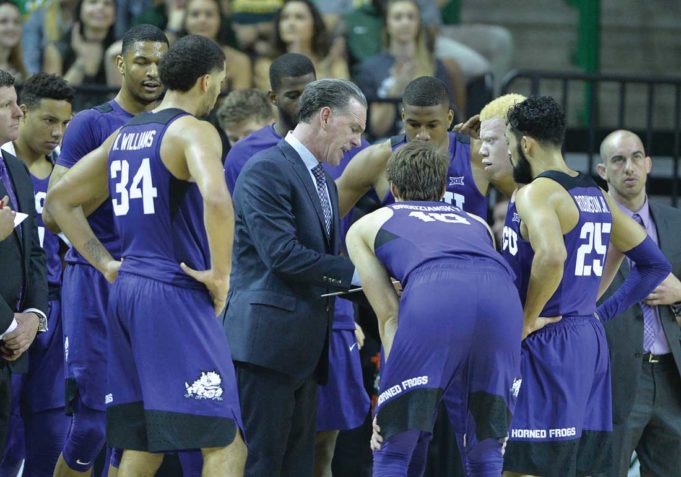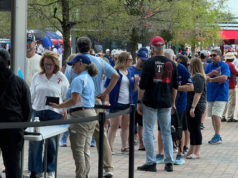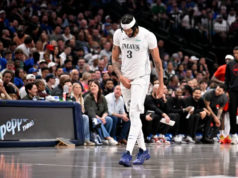For most TCU fans, there are two sports: football and baseball. What happens between those two? For two decades, there hasn’t been much more than an annual Christmas tree lighting, a concert, and a few comedy shows. There were murmurs that TCU had a men’s basketball team, but neither TV nor radio overtly or explicitly confirmed these reports until Coach Jamie Dixon, a TCU hall of famer and four-time basketball coach of the year honoree, arrived in hopes of cutting down some nets.
In 2015, the TCU men’s basketball team hadn’t had much to crow about over the last two decades. The Frogs hadn’t made it to the NCAA tournament since 1998 (making a first-round exit then) and had made the NIT only twice since the turn of the century. Since joining the Big 12 in 2012, the Frogs had an 8-60 conference record prior to Dixon’s arrival, never winning more than four conference games in a season. The building of Ed & Rae Schollmaier Arena seemed more to honor the women’s basketball team, who have long been the notable hoops stars, appearing in 10 NCAA tournaments out of 11 seasons during the Jeff Mittie era.
As a TCU alum and a basketball coach, I remember cringing with trepidation upon TCU’s arrival in the Big 12. In the Mountain West Conference, the Horned Frogs struggled against better teams like New Mexico and San Diego State. The top teams in the Big 12 are on a completely different level. Had roundball made TCU a national embarrassment? No, but TCU nation has developed a taste for national relevance since Frog football and baseball programs achieved national rankings in 2003. Fans have grown accustomed to a little recognition, craving national attention like air, or water, or the harvester ants that horned frogs eat.
Enter Coach Dixon, who is immortalized in Frogs hoop lore for his buzzer-beating 35-foot shot to down the University of Texas in 1986. He went pro in 1987, drafted by the Washington Bullets before playing for the LaCrosse Catbirds of the Continental Basketball Association, and then dribbling abroad in New Zealand after that. He was inducted into the TCU Hall of Fame in 2007.
TCU is Dixon’s second head coaching job at the collegiate level, after serving as head coach for the University of Pittsburgh for 13 seasons. He took the Pitt Panthers to Sweet 16 appearances twice, an Elite Eight appearance once, and a No. 1 ranking in 2009. Overall, he led the team to seven consecutive NCAA tournament appearances.
This year, Dixon has already achieved a 6-6 conference record, including the first regular-season sweep of UT in 30 years and the first victory over Iowa State in 20 years. There are also rumblings that TCU’s current 17-8 record overall could make a case to the selection committee to be included in the Big Dance, starting the week of March 14. If the team can keep up resilient performances on the road as they face Iowa State, Kansas, and Oklahoma, and protect Schollmaier Arena from Oklahoma State and Kansas State, then they will have built the strongest argument for tournament inclusion in 20 years. These Frogs would be only the eighth men’s team to represent TCU at the tournament since the tourney’s inception in 1939.
Naysayers might claim the conference is suddenly weak, but the Big 12 might be the most competitive in basketball this year, top to bottom. Every single team has received votes in the Associated Press’ Top 25 poll at some point in the season, and Baylor, Kansas, and West Virginia have all been ranked in the Top 10.
One coach, even a heralded one, doesn’t make a team. The Frogs play balanced basketball with sound defensive philosophy, mixing man-to-man and zone concepts with an emphasis on defensive rebounding. Dixon’s team is opportunistic in transition and executes its standard offense through the paint with rangy Slovak forward Vladimir Brodziansky, a junior who has transitioned away from outside shooting to smooth inside spins and pinpoint mid-range jumpers. The upperclassman leads the Frogs in scoring at 14 points per game and is second in the Big 12 in blocked shots and field goal percentage thanks to his precise hands and 6’11” frame. Rebounds are muscled out by junior guard Kenrich Williams, a 6’7” Waco native who’s the second best rebounder in the conference.
Sophomore point guard Alex Robinson, a product of Mansfield Timberview High School and a transfer from Texas A&M (whom Dixon unsuccessfully recruited for Pitt), has logged the most game minutes of any TCU player this season. Freshman guard Jaylen Fisher brings youth and optimism for the future, the newcomer proving himself capable of driving, dishing, and diving for loose balls. Dixon’s team has experienced big men and young role players – there are lots of wins to look forward to in upcoming seasons.
No matter how this season ends, Dixon has changed hoops and is inciting hollers in Fort Worth. Dixon has a record of success, a love for his alma mater, and the ability to infect Fort Worth with the beginning stages of March Madness.












